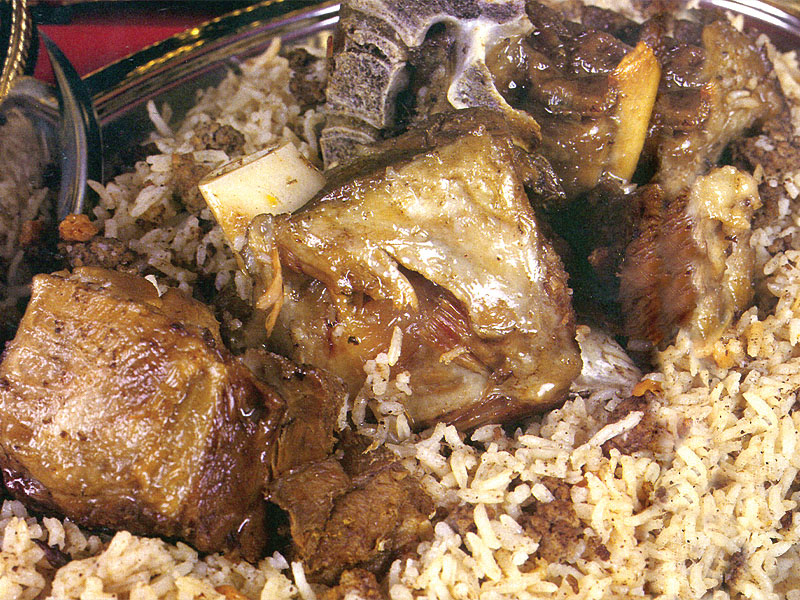Traditional Food and Globalization
Issue 9

Mariam Bsheesh (Syria)
The fact that women of all countries and continents, particularly provincial women, assume the main responsibility for “preparing” food should not be ignored. More correctly, women are responsible for most stages of food production and preparation. Women feel strongly the need to provide their families with healthy nutrition year around. Because many food basics are produced only during certain seasons, she must see that an adequate supply is stored for use during the winter. For purposes of this research, the author defines globalization as the movement of finances, information, science, exports and imports across geopolitical boundaries at great speed. Globalization reduces the time needed to cover great distances, making the world seems smaller. Globalization makes the global market accessible to virtually everyone, including the companies which are competing to win ever greater shares of the market in order to better serve potential clients. The basis of globalization is the trading process, irrespective of the materials being traded. Corporate businesses constantly compete to find ways for locating new consumers, thus proliferating globalization and the “culture of consumption”. Globalization, then, is not only about the trading of goods. It also concerns itself with spreading culture, nature and anything else reasonably likely to make a profit. The author stresses that preserving local heritage results in conservation of the very kinds of richness and variety that give cultures their own identities and characteristics. The speed at which the world changes underscores the need to raise awareness and demonstrates the importance of local heritage, with its elements, simple as they are, with the aim of utilizing the potential benefits derived from conservation. The current attack on globalization is not intended to prevent change, rather it is an attempt to hang on to our identity and cultural distinctiveness while we still have them. Meanwhile, we study and make use of international experiments, applying them consistently and in accordance with local standards of decency. We utilize the new technology of communication to advertise our products, our heritage and experiences too, as our prosperity is not all in the “past,” which we proudly recall. It waits, rather like an opulent mine for us to extract both moral and material benefits. Environmental activists say: “Think globally and act locally,” while activists in the field of culture declare: “Think locally and act globally.” Local initiatives, then, must be quickly taken and disseminated in order to spread our culture. Our culinary heritage, in this sense, might be a basic element to start with. The first urgent step is to document all our local dishes, the occasions on which they are served, and the social customs which accompany them. This is a task that falls on the shoulders of all intellectuals and other concerned persons. If we can create an archive of our traditional cuisine gathered from everywhere, then the next step can be more easily accomplished with the availability of this resource for reference. In this context, we might propose launching programs dedicated to the study of local dishes, or activating the role of hotel institutes and the young men who are enrolled therein, to produce new dishes based on conventional dishes or to initiate varied and modern traditional food festivals in various places in our country. This would demonstrate the distinctive individuality of each region. We might also organize contests for cooking and marketing local food, produce scientific leaflets and publications in many languages that are concerned with our traditional cuisine and disseminate them to a targeted readership. This initiative, regardless of its value, should be accompanied by an abundance of ideas solicited from the public with the aim of drawing attention to the importance of this basic element of our heritage. In so doing, we will stress its richness and increase the will to preserve it, which is particular timely considering the recent founding of a new civil society in our country. This new civil society has been named “The Syrian Society for Food Connoisseurs.” Its aim is to introduce people to traditional food. The majority of people, however, have unfortunately not gotten acquainted with The Syrian Society for Food Connoisseurs, as it has not organized any kind of popular activities so far. We should nevertheless be optimistic about our ability to meet the requirements necessary in order for us to successfully launch a local initiative in the international market. Why then, should we not take advantage of the traditional dishes and create new ones based on them - dishes that belong to us, to carry our message to the world? This would preserve the identity and uniqueness of our cuisine in the face of globalization and its “unifying culture.” Isn’t our heritage rich with resources and don’t we possess creative minds and working hands as well??


































































